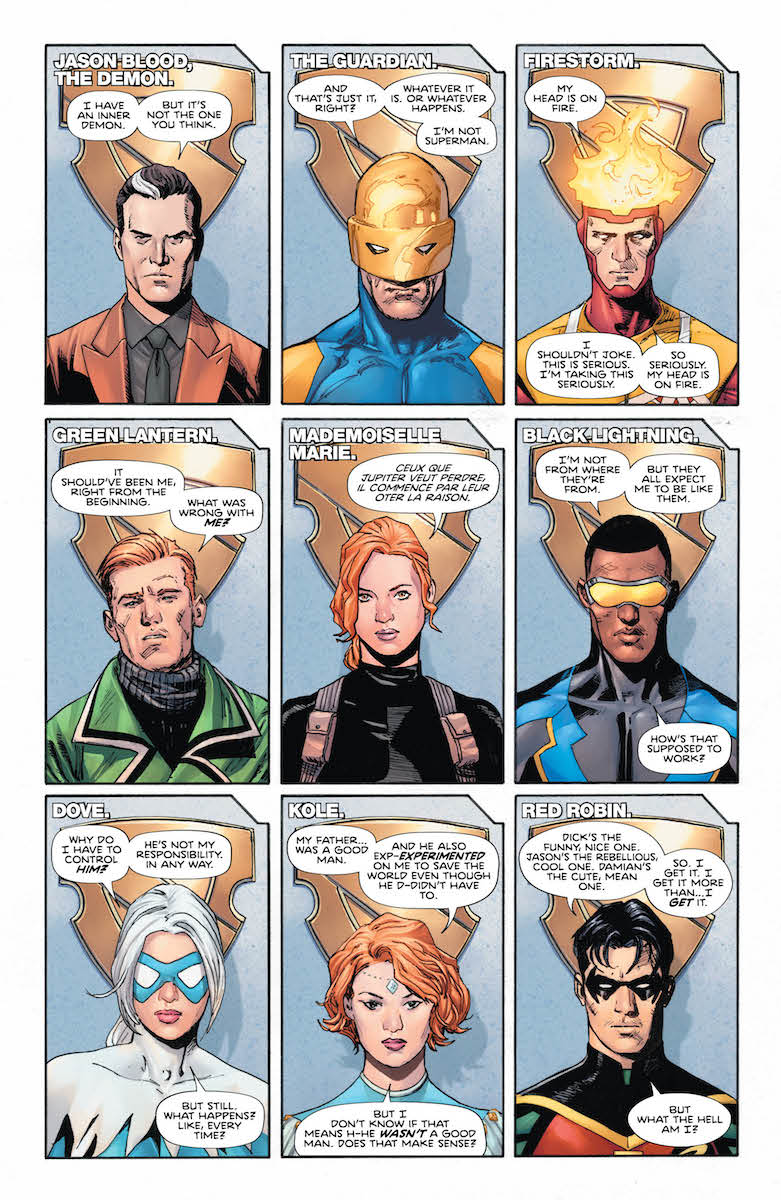
Heroes in Crisis #9 – Tom King, Writer; Clay Mann, Artist; Tomeu Morey, Colorist
Ratings:
Ray – 7.5/10
Corrina: What Was the Point?
Ray: The biggest frustration of Heroes in Crisis as it reaches its final issue is that it has occasional flashes of brilliance mixed in with a central plot that doesn’t work at all.
For a climatic issue of a comic book event, not all that much really happens in Heroes in Crisis #9, which both works for the concept of the series and leaves it not feeling like much of a finale at all. There’s more of the “confessional” videos in this issue than any other, showing us the video diaries of 45 heroes who have passed through Sanctuary, and they’re the highlight of the issue. Some, like Jessica Cruz or Fire and Ice, are genuinely affecting. Some, like Red Tornado’s, are hilariously meta. Then there’s the Robins (and Steph) who have a hilariously escalating meta-gag that delivers far more laughs than this issue should. Cass showing up for a worldless cameo is very on-brand for how DC typically treats her. But all this does is remind me of just how compelling a comic that was actually about superhero therapy could have been.
The bulk of the issue takes place at the scene of Wally West’s planned suicide/murder of his past self, as the four core characters of Booster, Beetle, Ivy, and Batgirl crash-land in the Bug just in time to prevent it. They’re met not just by two Wallys but by a new, elemental Poison Ivy who seems to have evolved into a completely different character (Harley is unfazed, and still quickly embraces her girlfriend in the issue’s sweetest scene). Largely, they all seem to view Wally as a victim of his own trauma and talk him out of killing himself, instead seemingly getting him to commit to spending his life to make up for the horrors he accidentally caused. It would be a good message – but the tone is all over the place.
You’ve got Booster doing bizarre time-travel riffs, Harley getting brief but painful revenge on Wally, and other odd comic touches amid a horrible tragedy that wiped out dozens of young heroes – including one of Wally’s best friends, Roy Harper, who turned out to be rather inconsequential to this story. Ultimately, it’s a well-written anticlimax that sends the big “Wally West question” off to another story, and a strange end to a very strange event.

Corrina: If you ever wondered if this series could make a point about mental health, or provide us with a good murder mystery, or some insight into DC’s stable of characters, this issue provides a final answer.
It’s no surprise to anyone reading these reviews that this answer is “no.”
All those minor B-and C-list heroes are still dead. Those deaths can’t be undone but Wally’s killing of his future self can “oh, hey, I have a time machine and I can get a dead body” because I guess we’re not killing Wally West after all. (Note: if DC wanted to pull this rabbit out of their hat, why didn’t they do this for all the other bodies and reveal the people are alive after all, having been healed in the future, and come back with them all? I guess only Wally is worth it, even though he’s responsible for all the deaths?)
Meanwhile, other heroes tape more confessionals (or they’re tapes of other confessionals from before the killings) and while Ray believes they’re the highlight of this, they seem to me like a reason for the creative team to have a comment about each character, some in a weirdly snarky way.
In the end, the series leaves us with Sanctuary, which was supposed to help heroes heal from trauma, but instead was an extremely flawed premise that allowed those suffering to wander around in virtual reality without supervision so they could make themselves worse, as Wally did, and led to the massacre.
So, those who set it up should be partially responsible for the deaths but I doubt that will ever be addressed.
And while the sentiment of the other heroes that Wally needs to live and regain himself is nice, it sweeps his whole “I’ll frame these other two people cause them trauma” under the rug, and Wally doesn’t even think about one of his best friends, Roy, who was killed at his hand.
As for mental health, the series also leaves the impression that people who need help dealing with trauma are inherently dangerous and are so out of control that they don’t notice who they hurt until it’s far too late. That’s hardly a positive image for those struggling, especially since the series never shows real-life techniques that might have helped them.
Heck, the last image is of Wally alone in a cell and I’m sure physical isolation will be just the thing he needs right now. /sarcasm.
To find reviews of all the DC issues, visit DC This Week.
Disclaimer: GeekDad received this comic for review purposes.




